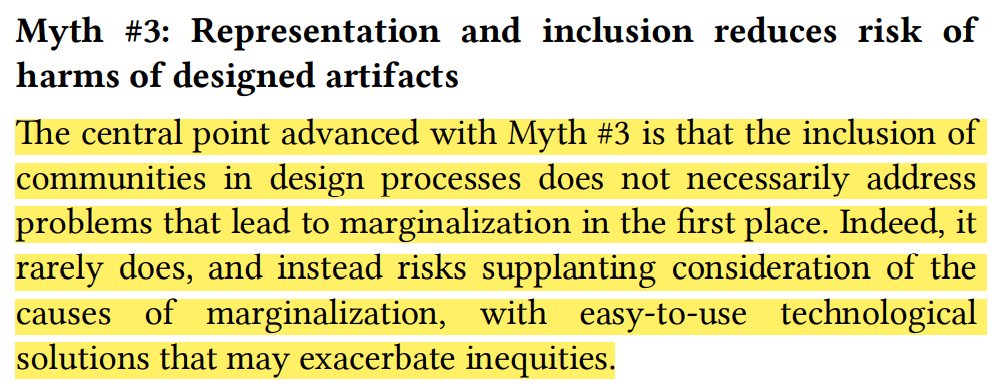5 Myths of Co-Design for Ethical ML
- ‘Better’ involvement➡️ 'better’ design outcomes
- Co-design increases agency of patients
- Representation reduces risk of harms
- Co-design is an inherently ethical approach
- All problems can be co-design problems
@josephdonia @jayshaw29 1/
- ‘Better’ involvement➡️ 'better’ design outcomes
- Co-design increases agency of patients
- Representation reduces risk of harms
- Co-design is an inherently ethical approach
- All problems can be co-design problems
@josephdonia @jayshaw29 1/

Novel challenges when co-designing AI:
- participation is often unwitting (eg as training data)
- AI technologies can be repurposed after deployment
- black box nature
- hard to account for how data produced by system will be used in future 2/
- participation is often unwitting (eg as training data)
- AI technologies can be repurposed after deployment
- black box nature
- hard to account for how data produced by system will be used in future 2/

"Better" involvement does not imply a stronger focus on the whole system (including consequences related to data commodification & surveillance), much of which is out of view for both users & designers 3/ 

The inclusion of communities in design processes does not necessarily address problems that lead to marginalization in the first place. Indeed, it rarely does. 4/ 

Questions to ask (design humility):
- when does co-design substitute other methods of public interest & action?
- what are the limits of design research?
- who is sidelined and what might we learn from them?
- when shouldn’t we design? 5/
- when does co-design substitute other methods of public interest & action?
- what are the limits of design research?
- who is sidelined and what might we learn from them?
- when shouldn’t we design? 5/

Above quotes from "Co-design and Ethical Artificial Intelligence for Health: Myths and Misconceptions" by @josephdonia @jayshaw29
Great paper, read it here: static1.squarespace.com/static/54fa1ee…
Great paper, read it here: static1.squarespace.com/static/54fa1ee…
• • •
Missing some Tweet in this thread? You can try to
force a refresh














